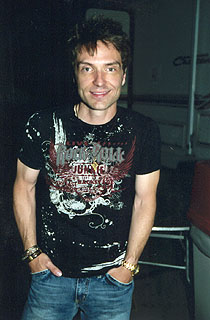 Richard Marx
Richard Marx
'Still Right On The Marx!'
Richard Marx emerged onto the music scene late in the 80's, and made the transition from the 80's sound to the more gutsy 90's musical style without any notable effort, and seemingly in one fluid motion. Many of his earlier hits such as 'Don't Mean Nothin'' (1987), and 'Satisfied' (1989) fell smoothly into place in this newly emerging 90's sound.
Perhaps it was because his music had always been a bit ahead of its time that so little effort was needed on the parts of both new and old fans to find a new voice within the old one. His successful progression could also be a proper testament to the life he lived prior to his becoming what he is today - one of the world's most loved and enduring singer/songwriters.
Marx and 1989's Repeat Offender generated a string of three consecutive number one hits in America - 'Hold on to the Nights,' 'Satisfied,' and 'Right Here Waiting.' With the release of Rush Street in 1991, his commercial fortunes started to slip somewhat as the mainstream shifted away from the slick, well-constructed songs that are his forte.
Despite the Top Ten hit single 'Now and Forever,' 1994's Paid Vacation fell from the charts quickly, and Marx entered a period of seclusion, returning in the spring of 1997 with Flesh & Bone, an album tailored toward the adult contemporary market.
Days in Avalon was quietly issued in fall 2000, but now, as if poking his head out into a world that he feared once lost to him, Marx is back on tour and even has recorded his seventh album, My Own Best Enemy on EMI/Manhattan Records.
Growing Up:
The start to your musical career included singing on commercials and being a backing vocalist for Lionel Richie … tell us more! ”Well, I was so young when I figured out what I wanted to do for a living and what I wanted to be when I grew up. So, there was no period in my life where I was like, ‘Geez, maybe I’ll be a Fireman, or a Lawyer.’ There was never any question. I just had that focus, that one-track mindedness. So, in my case, what I really wanted to do was what my parents did. My dad was a jingle composer, and also a jazz pianist. In fact, he was just an incredible musician, composer, arranger, conductor, and orchestrator. And my mom was a singer, who sang all the jingles that my dad wrote. So, I grew up not only seeing my parents work in music for a living, but obviously it was a very musical house.”
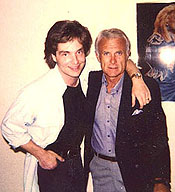
”It was my dad that sat me down first. My dad was never home early from work, and I remember coming home from school one day when I was twelve and my dad was home, which I thought was weird. He said that he had to come home early and then he sat me down next to his really nice stereo in his office and he played me the ‘Hotel California’ album. So, some of the albums that really affected me, inspired me, and even molded me into a songwriter and artist were records that my parents turned me onto. They weren’t into what all my other friends’ parents were into. So, I started doing jingles when I was really little and so to me going to the studio to sing jingles was like going to the park to play baseball.”
”Then, I left Chicago when I was eighteen, as soon as I had graduated High School, on the advise of Lionel Richie - who I had gotten to know through a friend of a friend of a friend. And he really suggested that I come to LA. And as I knew it wasn’t happening in Chicago, I went to LA without any job and without any place to live. I just went out there to see what would happen.”
”So, Lionel let me hang out in his studio when he was making his first album. This is all when he had left The Commodores. And he just tried me out on a background vocal part on this one song, which was called ‘You Are’ … which was a big hit for him. He had been looking for the right blend, the right tempo for weeks. And to me, the idea of worrying about background vocals for weeks is, well, it should take one hour tops,” he laughs. ”But, I tried out for that part and he said ‘That’s the sound that we’ve been missing.’ So, I ended up singing on that whole record and all of his solo records for the first three or four albums that he did.”
”At the time, Lionel was about as big as it gets. It was just him and Michael Jackson as being the two biggest guys going, so my resume only had the one name on it, but it was Lionel Richie! And it got me in other doors and then other people started listening. And like many other businesses, suddenly the word started to spread.”
Those Early Chart Years:
But then, in ’87 you topped the charts with the release of your self-titled debut … what were things like for you back then at that time? ”I don’t remember much about it all, and not because of drugs or booze,” he laughs, making a point. ”Nothing sexy or tainted. I just don’t remember much of it because the idea of being mesmerized by the immediacy of the success was sort of impossible for me at that time. I mean, I was working my balls off! And when I went on the road to promote the first album, it was a couple of weeks before the album came out and we just had the song ‘Don’t Mean Nothing’ out. But I do remember being mesmerized by that because I started my career at rock radio and the single was just so instantly accepted. And the first week that came out – from a debut artist that nobody really knew anything about – there was just like this massive acceptance for that song … and then the record. So, I went out on the road feeling at least optimistic that maybe we were doing something right, but I knew there was a lot of work ahead. What I didn’t expect was that I wouldn’t come home for 15 months!”
End Of An Era:
As your albums progressed into the early ‘90s, do you feel your slick, well-constructed songs were getting bitten in the ass by the newly-created Grunge scene?! ”Oh yeah, that was primarily what changed the landscape. And I’ve thought about this many times. It was back in ’94 when I put my last Platinum album out and things were still fine. Although, I was aware that there was a shift, but in ’94 and ’95 I still had a very successful tour, sold a couple of million records around the world, and had a couple of big hits. But I knew something was changing. And I always knew that day was coming. I was just glad to have had those eight or nine years of steady success. When I look back now, had it have just been me that would have been really, really hard to take … as it is for any artist that simply runs out of gas. Or, not even that, when you just fall out of favor. What happened was pretty much the entire genre of music got bitten in the ass, as you say, so it wasn’t just me. It was me, Bryan Adams, Billy Joel, and Elton, and anybody that was doing this genre of music. The white-male singer/songwriter then ceased to exist on the charts.”
”And so, I had a choice to make at that point. I could either get myself a white dinner jacket and go to Vegas, sit at a piano and sing ‘Right Here Waiting,’ or try and reinvent myself in a way that I could still stay musically current … and viable! I remember thinking that it wasn’t my turn as a singer any more and I couldn’t be bitter about it, but I also knew that I felt like my best music was still in front of me.”
”So, I went back to what I was doing in the beginning which was writing for an assortment of other people. And I was just fortunate that timing was on my side as *NSYNC needed a song! So, I sent them in a song that they loved. Then, Justin Timberlake then told me that he wanted me to actually produce it too, so that all ignited the way my singing career had – with an instant huge smash with ‘This I Promise You’. So, not only was the song itself a really big hit, but it was part of an album and a phenomenon where they were just the biggest thing in the world selling 12 million albums!”
Working With Luther:
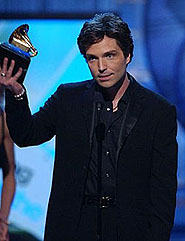
How did your relationship with the late, great Luther Vandross come about … and what did winning the 2004 Grammy for Song of the Year with ‘Dance with My Father’ truly mean to the both of you at the time? ”Well, I had a pretty long association with him having become friends back in ’91. Around that time he did a Christmas album and called me up and asked if I wanted to write a song for his Christmas album. And, I also have to say I’m so grateful even at that time for what he did. He didn’t really write with anybody, but his little posse of guys. So, for him to reach out to somebody outside of his comfort zone was an honor. And so we wrote a song that was the single from his Christmas album, then we wrote another song a couple of years later on another album. But, more than that we just became really good friends.”
”And so, when he had this idea for the song ‘Dance With My Father,’ which was very much his idea and a tribute to his own father, we had already established such a long standing friendship that I think he just trusted that I’d be the right guy to collaborate with. So, I loved the title, got this idea, wrote this piece of music, and sent it over to him … and the song was born.”
Were you truly bowled over by all the Grammy accolades that then followed for the song? ”Oh yeah, I was bowled over. I couldn’t believe it. And, you know, the circumstances made it all the more strange, because it wasn’t like I said I can’t believe this and then turned to look at my collaborator! I mean, we would have just been like two kids up there that night! No, I had to do it for the both of us, because Luther was incapacitated at the time. Which was strange, as it felt weird for me to be up there accepting that award. It felt weird on a number of levels. But, what I knew immediately was how much this song meant to Luther. I remember the phone call when it was finished when he said to me that it was the most important song of his career. He said that this was his ‘Piano Man’ … he really felt like that song was finally his signature song, which ultimately – even in death – it is.”
Life Off The Road:
When you left the singing career behind, was it immediately the time to become a real father for the first time? ”Well, what was good about the family thing was that it took me off the road for sure. It shifted my career and meant that touring was not something that I did any more. Which, yeah, was great for me as a father, and was also great for me as I was exhausted. I hated touring. I hated performing. I got to the point where I did it so much and for such a long, grueling period of time that didn’t enjoy it anymore. And, it’s one of those things, like any number of examples, that when you get away from something long enough that when you come back to it you think, ‘Oh man, this is really great.’ Which is kinda what I’ve been feeling for the past year. I never contemplated quitting, because I very clearly know I don’t know how to do anything else! I couldn’t keep occupied or stay excited about anything else. I would love to have been a professional tennis player, but now I’m too old for that. I would love to have been the head of a charity foundation and be the one making all those decisions, but I’m not corporate enough. I don’t have the rug burns for it, you know. So, I didn’t contemplate quitting the business, but I seriously contemplated – and I actually said at the time – that I thought I was done singing. I thought that my career as a singer had a beginning, a middle, and an end. And, at the time, as it is now, my career as a producer was thriving. But it was one of those things through my notoriety as a producer and as a songwriter, that my profile heightened within the industry in a different way. And then somebody said, well, why don’t you make another record? And I remember thinking, well, I don’t do that anymore! But, it just felt right ‘cause it was with the guy who originally signed me to my first record deal, Bruce Lundvall. And he and I hadn’t worked together since my first album. But, he’s the guy who said yes when everybody else had said no! So, to get back years later with the guy that believed in me from the get-go, just felt right.”
The Latest Album:
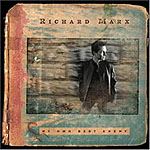
Last year’s My Own Best Enemy is a very strong title, but is it self-mocking also? ”Well, yeah, it’s definitely not my own worst enemy,” he points out. ”It’s definitely not. I don’t think I’m like that to myself. But, it’s a little complicated, because the joke was that the title came from me joking around in the studio. It was said to me then that when things are too easy I find a way to complicate them ’cause I thrive on the challenge. If it’s just point A to point B, anyone can do that. So, I’ve found that I put speed bumps in my own path just to make things a little more interesting. And, if you put speed bumps in your own path and you crash and burn you are your own worst enemy. But if you put speed bumps in your way and you make it better, at the end if the day it makes the destination more glorious … and that really works for me.”
”Oh, and by the way, it was very close … it was between ‘My Own Best Enemy’ and ‘The Artist Formerly Known As Popular’!,” he smiles, ever so wryly.
You’ve been quoted as saying that you ‘don’t like writing happy songs’ and that ‘it’s the darkness that appeals’ to you … is this true?! ”When I started writing for my first album I was 23 and I had even written some of those songs when I was 20 and 21. And I don’t know how much poetry there is in those songs, really! They are pretty much all negative, cynical and tend to lean towards the dark more than the light. And yeah, there have been a couple of songs that I’ve written that were positive, happy songs, but generally the answer to the question is as I’ve gotten older and tried to challenge myself more as songwriter, it’s really all about the poetry for me. And trying to find poetry in happy circumstances is hard. And not that it’s not worth pursuing, but my favorite poetry is dark. To me, happy poetry equals greeting card, you know. Sappy and saccharine. So I think that I tend to explore the darker themes just as the antipathies of that. I just don’t get compelled to write about all the happiness. Also, the feeling of happiness is like mercury. Put it in your hand and then oh, it’s gone. Sadness, melancholy, … man we can hold onto that shit forever! I can lay in that dark, sad place and never get tired of being there.”
New Projects:
Tell me more about your movie project ‘Love At First Song’ … is it still coming together? ”It seems to be. It’s just it’s still in the early stages, and nothing that I can really talk about that much as there’s not that much to talk about yet. Except that it’s a film project created by Randell Wallace who wrote and directed Man In The Iron Mask.’ We’ve been friends for several years. He started out as a songwriter and so we’ve always been looking out for something creative to do together. So, he came up with this idea for the movie and it’s such an interesting concept. It’s fresh, it’s cool, and the music is so important to the project. At this point, he and I are gonna write the original songs and I’m hoping that whatever score there is I’ll be involved in that too.”
The Fun Four!:
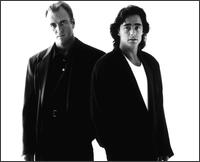
What cheesy '80s song would you love to cover today if asked ... and why?! ”It would be ‘Goodbye Girl,’ by Go West. Peter Cox, the lead singer has an incredible voice and I think I strengthened my own voice before I started touring on their songs! They were big a year or two before my first record came out and I remember their song ‘Call Me’ where he did this really cool vocal riff [Richard now proceeds to sing a little bit of it to take himself back for a split second!] and I used to play the Go West CD cranked in my car! And I would sing to it because his vocals were sort of my vocals exercise.”
If there were just 3 words that described Richard Marx’s music, what would they be? ”Hated by critics,” he laughs, his eyes betraying the fact that the words were that quick to formulate!
Do you have a current personal favorite to sing on stage these days? ”Well, it’s kind of a corny, stock answer, but it really kind of depends on the night. I mean, right now, from an emotional standpoint, a song from the new album, ‘Ready To Fly’ is definitely one of my favorite songs that I’ve ever written. I’m really look forward to singing it every night. It’s really personal, it’s not a love song, and it’s not dark … it’s about coming out of the darkness! But also, from a fun standpoint, I love singing the one song that I got sick of singing over the years, which is ‘Should Have Known Better.’ I just remember like three or four years into having been singing that song that I just got so sick of it. I wrote that song when I was 20 and I was just bored with it.”
Any other songs of yours that you sometimes ‘drift’ through?! ”It depends. Sometimes I’ll sing ‘Right Here Waiting’ and after all these years I’ll still get so emotionally wrapped up in it. And then, to be honest with you, sometimes I’ll sing ‘Right Here Waiting’ and I’m thinking about room service. I’m thinking about where the Starbucks is tomorrow and things like that!”
Getting To The Heart Of The Matter:
With a lot of your songs about finding that special someone, continually looking, making endless searches for that love of your life not yet found, how easy is it for your wife of many years to listen to?! ”Yeah, I’ve never talked to other songwriters about it, but sometimes, yeah, it’s the elephant in the room! Sometimes my wife has been so respectful of trying not to invade that creative space that she’s never questioned me about the songs that I’ve written! But, we actually did talk about this recently and I told her there are two schools of thought: In some ways is it prophetic? Is he writing prophecies? On the other hand, I have been in the same relationship for almost twenty years, and I attempt to always write emotionally-based lyrics. So, I can’t always write about my same relationship, because sometimes songs come from imaginary relationships, sometimes from another couple that I know and watch what’s going on with them. Because, if I just stick to my own situation the room is really very small.”
”But yes, it definitely begs the question, ‘cause when one of my best friends heard the single ‘When You’re Gone,’ he looked at me, legitimately and asked, ‘Are you getting a divorce?!’ I was like, I don’t know … have you heard something?! I don’t think so.”
Finally, if you were asked to record a single for charity, and had to choose 3 other musicians to aid you in the project, who would they be, what instruments would they play, and what would the name of the NEW song be?! ”I would have Keith Urban play guitar, I would have Randy Jackson play bass, and I would have Larry Mullins on drums … and the name of the song would be ‘Safe & Sound’.”
Candid Photo & Interview by Russell A. Trunk
www.richardmarx.com
Back To Archives

